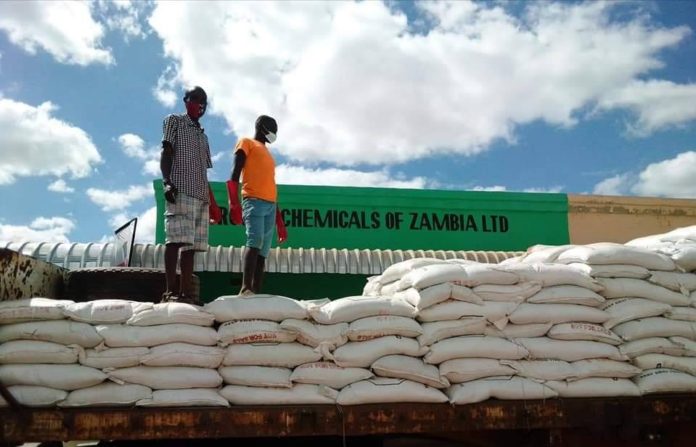The slow distribution of inputs ahead of the planting season in Zambia amid climatic change effects caused by bureaucratic procurement procedures has raised anxiety among farmers and is feared might impact on production and productivity for the 2022/2023 farming season if not revisited.
Zambia’s leading farming group-ZNFU notes that the delayed finalization of the procurement processes for the 2022 Farmer Input Support Programme (FISP) fertilizers and seed if not expedited could be a blow and spell doom on the sector that is still grappling with the climate change after effects following prolonged dry spells experienced last season as most smallholder farmers depend on FISP for farming inputs.
ZNFU president Jervis Zimba says in a statement to FRA notes that further delays by farmers to access the facility with the rains around the corner in some parts of the country coupled with a lack of clear direction on fertilise availability is feared may adversely impact on production and result in diminishing income opportunities, food insecurity and stagnation in the poverty trap for most farmers.
The concerned to the farming group has further been heightened because even the locally produced seed, the uncertainty is the same as on Fertilizer which is imported, a clarion call for the Government to take punitive measures to avert a looming disaster and a repeat of last season in which the country lost maize output by 25%.
Mr. Zimba calls for the immediate intervention by President Hakainde Hichilema into the matter and resolve all bottlenecks surrounding the ‘current FISP mess’ to instill hope and certainty in the minds of farmers noting that ‘the twists and a turn playing out in the public domain makes it difficult to discern the facts as the farming season looms
“There is no more time to waste. We appeal to President Hichilema to set up an Inter-Ministerial Committee to handle the issue of the 2022 FISP fertilizer and Seed availability, harness united efforts and coordinate timely delivery” Mr. Zimba said.
The Government needs to step up and realize the impending consequences and the possible catastrophe facing the beneficiaries. It remains imperative to ensure the affected access the seed and fertilizer without further delay than allow the impending disaster to come to pass after the much sought after inputs are distributed during the rainy season.
“Of what use will that be? This state-of-affairs could have been avoided if the roadmap agreed in April was adhered to because back then, the recommendation by the private sector was that the processes be concluded by June 2022.”
ZNFU appeals to the Minister of Agriculture to urgently address the farmers on the Fertilizer Procurement developments. Maize output slumped 25% to 2.7 million last season from the previous 3.6 metric tons harvested a season earlier on account of a reduction in the area planted and lower yields, agriculture minister Mr. Reuben Mtolo had said in a statement. He allayed fears of food insecurity.
He contended Zambia was still food secure given the carryover stocks of 1.5 million tonnes as farmers, millers, grain traders and the nation’s Food Reserve Agency (FRA) had stocks to fall back to.
Zambia will remain food-secure despite the ravaging storms that washed away some fields where some crops were planted. The country has enough food to meet the requirements in the event of the current farming season being adversely affected by floods.
A tropical storm, named Ana, has devastated vast areas of Mozambique, Madagascar and Malawi, triggering projections of significantly reduced crop production.
The Government remains on high alert over the tropical storm and is not overly concerned about availability of food and that people should not despair.
“We are food-secure as a country. We have enough stocks in our reserve to last us this season. People should not panic. Zambia’s increasing output of the staple food has raised interest among its neighbors including East Africa where drought has affected food production.
Kenya and other countries in East Africa want in excess of 500,000 metric tons of the grain. Regional neighbors Malawi, Angola, DR Congo, Mozambique and Namibia, among others, seek an estimated 800,000 metric tons in exports to meet consumption needs, agriculture minister Reuben Mtolo had told FRA last month.
“We are overwhelmed by inquiries from our neighbors and beyond, the region needs our maize while from East Africa, mainly Kenya, they are asking for over 850,000 metric tons as you know that country has not recovered from the drought,”








